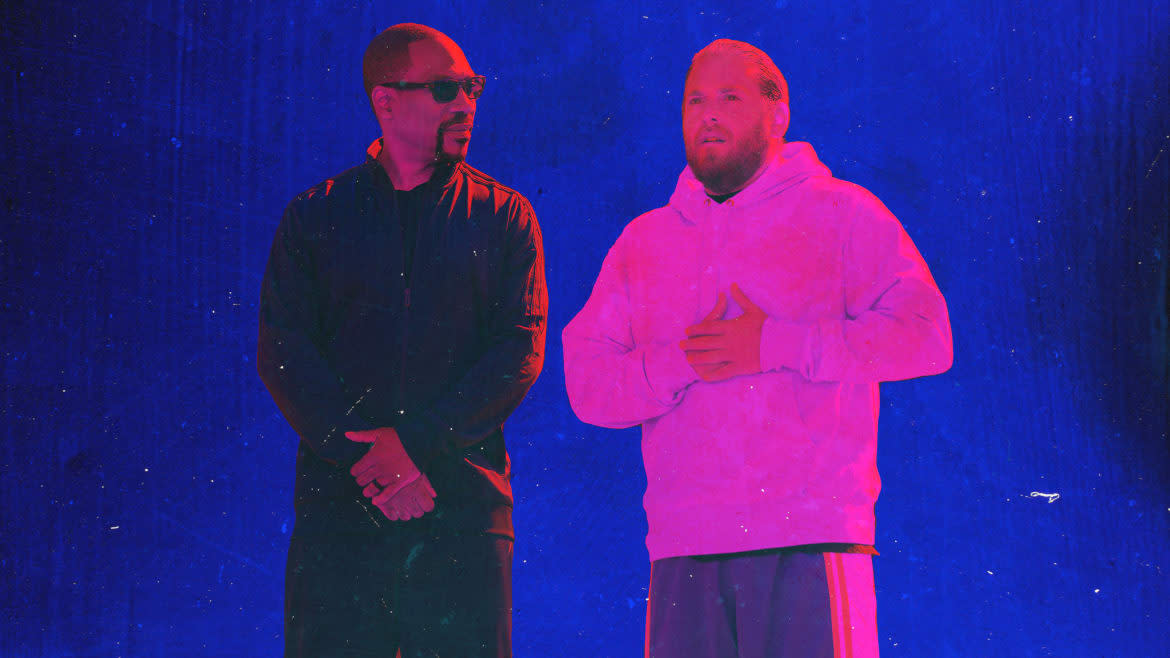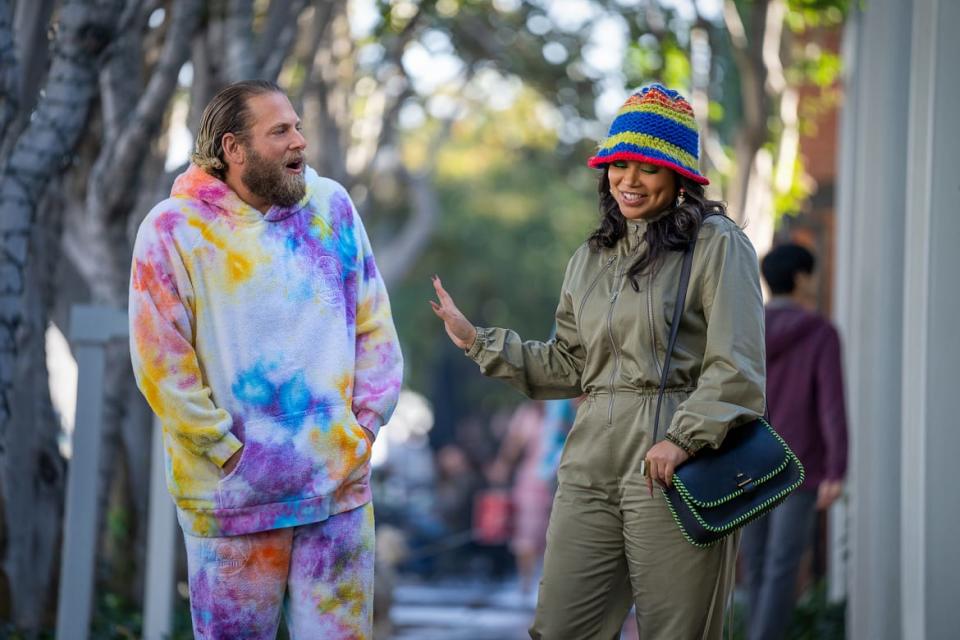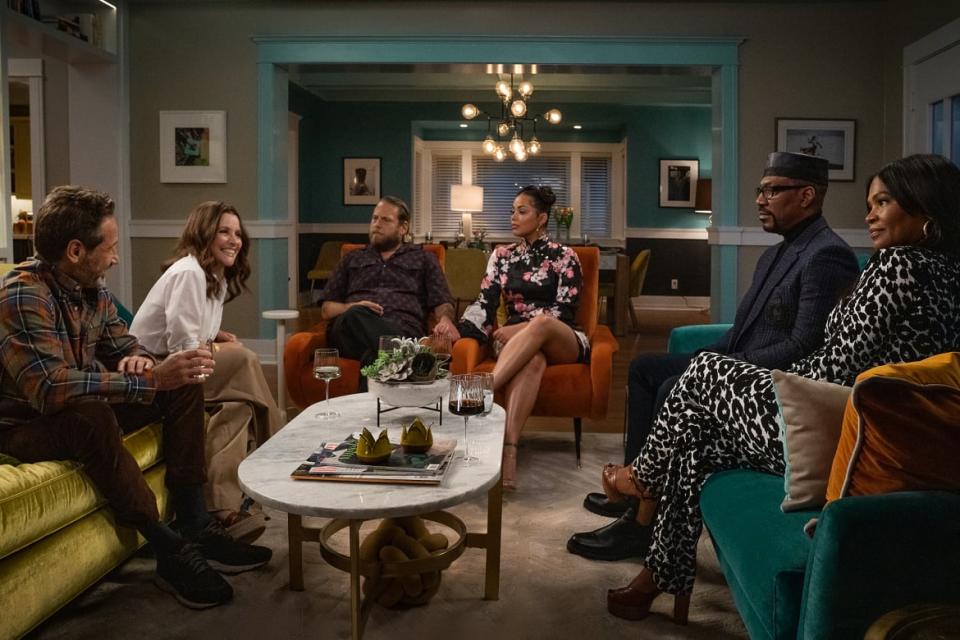‘You People’ Furthers ‘Black-ish’ Creator’s Obnoxious Racial Agenda

- Oops!Something went wrong.Please try again later.
- Oops!Something went wrong.Please try again later.
In 2023, Kenya Barris is the sort of auteur who evokes immediate eye-rolling and straight-up outrage upon the release of a new project.
Such was the response to his first Netflix venture #blackAF, released at the start of the pandemic. Black Twitter, as well as some TV critics, raised a number of objections to the one-season sitcom. Among them were Barris’ apparent preference for casting light-skinned women, the show’s awkwardly inserted lectures on slavery, and, of course, that silly title. The prequel to Barris’ hit ABC show Black-ish, the interracial family-based comedy Mixed-ish, garnered many of the same complaints.
With today’s release of another one of his ham-fisted comedies, Netflix’s You People, it’s clear that none of these criticisms have made Barris second-guess his approach to exploring race on-screen.
New on Netflix February 2023: ‘Outer Banks,’ ‘You,’ and More
To be clear, the problem is not that Barris explicitly addresses racial topics in his work. Rather, his perspective on Black people and the way we currently exist in the world has proven to be, in a word, problematic. His television shows have a habit of re-contextualizing Black history to fit faulty narratives or attributing social ills to personal hang-ups within the Black community. Moreover, these ideas are spouted with an unquestionable sense of authority. Unfortunately, his feature directorial debut You People is another example of this fixation gone awry.
A modern twist on the 1967 classic Guess Who’s Coming to Dinner, You People stars Jonah Hill as Ezra Cohen, a 35-year-old Jewish finance broker who unexpectedly falls for a Black, Muslim costume designer named Amira Mohammed (Lauren London). Most of the film’s “aw” factor relies on the fact that Ezra and Amira are complete opposites. Ezra is anxious and insecure, while Amira is confident and brash. Ezra works with numbers, while Amira’s artistic. Ezra grew up in the upscale neighborhood of Brentwood, Los Angeles. Amira was raised in Baldwin Hills. Despite these differences, Ezra openly displays an interest in Black culture, sporting the latest (clean) sneakers, enjoying rap music, and hosting a podcast with his Black best friend Mo (Sam Jay) all about “the culture.” Regardless, Amira and Ezra make a decent pairing.

It’s the couple’s racial and religious identities that bring them the most trouble, once they become serious and decide to get engaged. Ezra’s self-proclaimed progressive parents, played by Julia Louis-Dreyfus and David Duchovny, are open to having a Black potential daughter-in-law. Louis-Dreyfus’ Shelley is particularly ridiculous here, the type of well-meaning white person who’s so obsessed with seeming “woke” that her actions conversely become offensive. She squeals at the thought of Black grandchildren and declares her critical stance on the police unprovoked. While you recognize the type of overly apologetic liberal she represents, her character comes across like another one of Barris’ exhausting white caricatures: satirical avatars who don’t reflect the more subtle ways white people harm Black folk.
We Wrote a ‘Black-ish’ Episode That Criticized Trump. I Was ‘Crushed’ When ABC Shelved It.
Amira’s parents represent another end of the socially conscious spectrum. Her father, Akbar, played by Eddie Murphy, is what most Black people would consider a hotep. The first time he appears on-screen, he’s wearing a black hoodie declaring the obvious sentiment, “Fred Hampton Was Murdered.” He’s a member of the Nation of Islam and a proud supporter of Louis Farrakhan. He’s perturbed by the idea of interracial relationships and side-eyes Black people whose hair isn’t nappy enough. (Ironically, he makes these comments to his daughter, who’s portrayed by a light-skinned, biracial woman, despite having two dark-skinned Black parents in the film). Amira’s mother Fatima (Nia Long) is less outspoken but goes along with all of Akbar’s diatribes.
Even if viewers haven’t seen Guess Who’s Coming To Dinner or its 2005 remake Guess Who, we’ve all seen the romantic comedy about a forbidden or scrutinized relationship. You People blandly hits all of these same beats, resulting in a predictable and anticlimactic ending. More painfully, the film contains the lowest bar of racial comedy, from a scene where Akbar forces Ezra to play basketball with a group of Black men to another where he tries to provoke him into saying the N-word while listening to Jay-Z. The most unbearable scene by far is a stilted argument between Ezra and Amira’s parents over dinner about who is more oppressed, between Blacks and Jews.

Another absurd aspect of the film is how characters react to the idea of co-mingling with other races, despite living in present-day Los Angeles. Obviously, racism transcends location and persists over time periods. But even Katharine Hepburn was less scandalized when Sidney Poitier appeared in her living room in the 1967 film than You People’s characters are now, when they discuss anything having to do interracial relations.
It’s not that the characters in You People have nothing to be cautious about. There are legitimate concerns when people of color enter romantic relationships with white people—or any relationship, for that matter. However, You People never lays those issues out accurately. Instead, the Black characters come off as unreasonably stubborn and borderline hateful toward white people.
Diane Keaton and Susan Sarandon Destroy the Rom-Com in Cynical Mess ‘Maybe I Do'
While Ezra’s parents display some ignorance, they’re at the very least accepting of his relationship. On the other hand, it’s frustrating that the main antagonist in this film is an ultra-conservative Black man. It’s almost like Barris and Hill, who wrote the film together, don’t realize that the stigma they’re exploring is a result of white racism.
It’s equally frustrating that Ezra is often positioned as the partner with the most to be concerned about upon entering this union. When Ezra tells Mo about his first interaction with Amira, she immediately assumes the worst, despite knowing nothing about Amira or her family. “In this social climate, with this much racial intensity going on, you’re going to pull a move like that?” she says about pursuing Amira. “I hope no one ends up dead.”
With Hill and Murphy at the center, You People had the potential to fit in some laughs, even if the overall material is lacking. But almost every single joke and line of dialogue in You People is some cringy, unfunny gag about racism or a mocking depiction of corny white people. You can tell there’s a fair share of improvising, as much of the cast’s main players are known to do. However, these exchanges go on for too long, or it takes an awkward amount of time for a joke to land. In general, the film’s humor lacks the provocative punch it thinks it’s offering, as is par for the course with Barris’ works.
Is Jonah Hill Hot? An Investigation.
The result is that You People is another one of Barris’ flawed think pieces. I’ve never witnessed an auteur be so preoccupied with a subject while lacking so much curiosity about it. It’s hard not to spend the majority of the film wondering why he thinks any of his generic ideas about race, relationships, and the intersection of the two are compelling in the first place.
Simply put, it’s not enough to depict the obvious tensions between Black and white people, which You People does to nauseating effect. At some point, you have to read between the lines and present something interesting. For some reason, Barris still hasn’t gotten there yet.
Get the Daily Beast's biggest scoops and scandals delivered right to your inbox. Sign up now.
Stay informed and gain unlimited access to the Daily Beast's unmatched reporting. Subscribe now.

